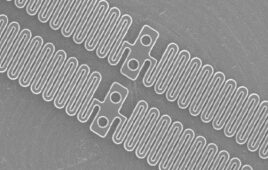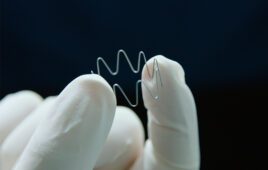
Modification of histones by the addition or removal of epigenetic factor molecules can regulate whether an adjacent gene is expressed. Image source: discovermagazine.com
A novel PET radiotracer developed at the Martinos Center for Biomedical Imaging at Massachusetts General Hospital (MGH) is able for the first time to reveal epigenetic activity – the process that determines whether or not genes are expressed – within the human brain. In their report published in Science Translational Medicine, a team of MGH/Martinos Center investigators reports how their radiochemical, Martinostat, shows the expression levels of important epigenetics-regulating enzymes in the brains of healthy volunteers.
“The ability to image the epigenetic machinery in the human brain can provide a way to begin understanding interactions among genes and the environment,” said Jacob Hooker, PhD, of the Martinos Center, senior author of the report. “This could allow us to investigate questions such as why some people genetically predisposed to a disease are protected from it? Why events during early life and adolescence have such a lasting impact on brain health? Is it possible to ‘reset’ gene expression in the human brain?”
A key epigenetic mechanism is the packaging of DNA into chromosomes, in which it wraps around proteins called histones to form a structure called chromatin. Modification of histones by the addition or removal of molecules, called epigenetic factors, can regulate whether an adjacent gene is expressed. One of the most important of these factors is the acetyl molecule, addition of which allows a gene to be transcribed and removal of which – called deacetylation – prevents transcription.
Enzymes called histone deacetylases (HDAC) are important regulators of gene transcription, and one group of HDACs has been linked to important brain disorders. Several established neuropsychiatric drugs are HDAC inhibitors, and others are currently being studied as potential treatment for Alzheimer’s disease and Huntington’s disease. Martinostat was developed in Hooker’s laboratory and is patterned after known HDAC inhibitors in order to tightly bind to HDAC molecules in the brain.
PET scans with Martinostat of the brains of eight healthy human volunteers revealed characteristic patterns of uptake – reflecting HDAC expression levels – that were consistent among all participants. HDAC expression was almost twice as high in gray matter as in white matter; within gray matter structures, uptake was highest in the hippocampus and amygdala and lowest in the putamen and cerebellum.
Experiments with brain tissues from humans and baboons confirmed Martinostat’s binding to HDAC, and studies with neural progenitor stem cells revealed specific genes regulated by this group of HDACs, many of which are known to be important in brain health and disease.
“HDAC dysregulation has been implicated in a growing number of brain diseases, so being able to study HDAC regulation both in the normal brain and through the progression of disease should help us better understand disease processes,” Hooker said. “We’ve now started studies of patients with several neurologic or psychiatric disorders, and I believe Martinostat will help us understand the different ways these conditions are manifested and provide new insights into potential therapies.”
Massachusetts General Hospital
massgeneral.org




